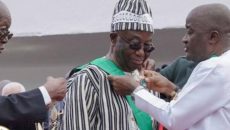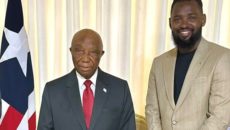Election day in Liberia came and went, with more than 1.6 million people voting for the next president of Liberia. It was a tight race, one that left two candidates without a majority and prompting a runoff election — a runoff election that was hotly disputed and delayed significantly.
After much legal wrangling, the two candidates, Vice President Joseph Boakai and Senator George Weah, finally faced off this Tuesday in a runoff election. The votes have been cast and are being tallied right now. One candidate will emerge victorious — and one candidate will lose the election.
While the other side celebrates, the losing candidate has a huge responsibility to his party, to the president-elect, and, most importantly, to the people of Liberia: concession.
In a country such as the United States, concession speeches have become an important rhetorical tradition that symbolizes the peaceful transition of power. An expert on the topic, political theorist and historian Paul Corcoran, described the concession speech as “an institutionalized public speech act integral to democratic life and the legitimacy of authority.â€
Corcoran has studied concession speeches since 1952, finding that most followed a specific formula that includes the following elements:
- Congratulations to the winner
- A call for unity
- A call for supporters to accept the result, but continue to fight for their cause
Corcoran says that the concession speech isn’t so much about the loser accepting the loss, but rather about encouraging the supporters to accept it. In his analysis, Corcoran has found that the closest elections have tended to have concessions speeches with a heavy emphasis on unity whereas losers in landslide victories tend to give concessions speeches that focus more on lifting party morale.
In a country such as Liberia, the people haven’t heard a concession speech in generations. After all, this will be the first peaceful transfer of power from one president to the next in a generation. It might not even cross the losing candidate’s mind to concede the winner simply because it hasn’t been done in recent history.
Not only has this been a hard-fought race, emotions have been running high on all sides — and that was before the legal positioning that followed the actual October 10th election. Voters are passionate about their candidates and their political beliefs. They want their candidate to win, and many will be disappointed. Some will be shocked. Some will be angry.
Whatever the outcome, the fact that Liberia will have a freely elected president is historic and cause for celebration. Even the fact that the original election results were challenged in court, peacefully, is cause for celebration. Liberia’s democracy has a process for disputes of this nature. While that process delayed the run-off election, it provided for a reasonable discussion of election “irregularities†brought up by the candidates themselves with the court’s verdict accepted by the complaining party. This is how democratic countries settle disputes, in court, and it shows us just how much Liberia has matured in recent years.
Whether Weah or Boakai loses this round, he’s likely to be sorely disappointed. Giving a rousing concession speech and praising his opponent will probably be the last thing he wants to do after a long campaign and a bitter run-off battle. Yet, a precedent should be set. A concession speech by the losing candidate would further position Liberia as a maturing and capable democracy, protect the fragile peace, help to heal a once failed-state, and set the stage for future peaceful transitions of power.
Featured photo by Lloyd Massah



